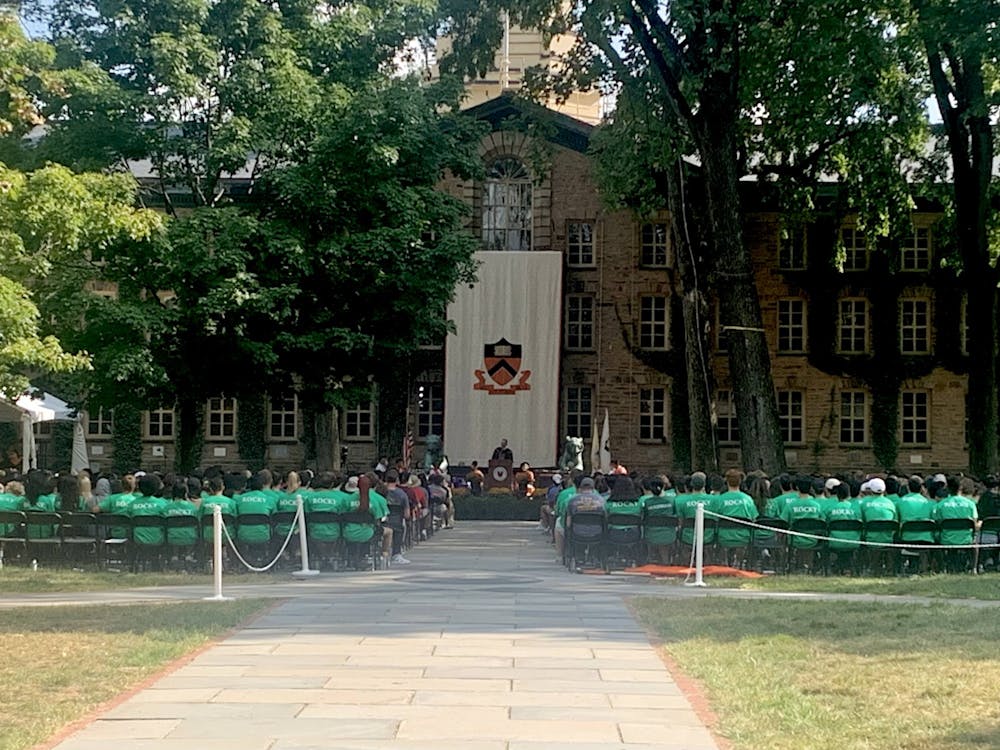Donning “Butler Bee” antennae, I joined the many students fighting for camera attention as I waited for Opening Exercises to begin. After a long orientation, I was excited to take part in a seemingly monumental and ancient rite of passage at Princeton.
What I did not expect was the level of religiosity. When the first speaker, Dean of Religious Life Rev. Theresa S. Thames — an ordained Elder in the United Methodist Church — asked us to “join [her] in a spirit of prayer,” she was not mincing words. In fact, it felt as though half of Opening Exercises was spent on religious speech. While certainly an enriching experience, the event was rather antiquated.
While Princeton was founded by Presbyterian pastors, it has always been a secular institution — a legacy best upheld by secular Opening Exercises. According to the most recent Frosh Survey from The Daily Princetonian, around 45 percent of the Class of 2028 identifies as agnostic or atheist. In consideration of the significant numbers of Princeton students who do not identify as religious, the University should move towards secular Opening Exercises.
I will admit that I was pleasantly surprised by the diversity of faiths present at Opening Exercises. This year’s ceremonies, in some ways, differed from those of generations prior. The agenda for Opening Exercises on Sept. 21, 1947, for example, consisted of events like Scripture, Hymns, and Prayers. Of the events, all but the Address and the Anthem involved Christian traditions. In 2024, we have expanded our religious horizons to include passages from the Baháʼí Faith, Judaism, and so on. Striving for equity, Princeton has continually chosen to include more faiths. It is an improvement that we have moved away from a singular religion, but this is not enough.
I believe religion is extremely important in the rich history of the United States, but prayers and blessings are not relevant to a mandatory introductory event at a non-religious university. We should focus less on our Latin motto, “Under God’s Power She Flourishes,” and more on our unofficial motto, “In the Service of Humanity.” To its credit, the event did have, toward the very end, a short “secular human blessing.” The poem “Mindful” by Mary Oliver spoke abstractly about nature. Even so, it still mentioned “prayers.”
The Prayer for Princeton, one of the components of the proceedings, could have been an opportunity to unite students (if you ignore of course the religious title). It could have been an opportunity to remind us of our similarities, not to continue to divide students by their faith (or lack thereof). Yet instead, we were invited to rise and pray to an “eternal god, the source of life and light for all peoples.”
The growing rate of atheist, non-religious, and agnostic students at Princeton is not just a trend of the Orange Bubble. In 2020, Gallup found that a mere 47 percent of Americans said they belonged to a church, mosque or synagogue. We see this trend at Princeton. The 2025 Frosh Survey, conducted in 2021, commented that “against a backdrop of rising national secularism, over half of respondents said they were ‘not at all’ or ‘not very’ religious.”
In the United States, we have many wonderful religiously-affiliated universities, but Princeton is not one of them. We could easily enjoy secular, yet still meaningful, Opening Exercises. Either before or after, we could have optional speeches for those interested in hearing religious texts and dialogue. It is important to maintain a healthy spiritual community, but faith should not dominate in a University-wide exercise.

Sasha Malena Johnson is a first-year contributing Opinion writer for the ‘Prince.’ She intends to study Politics and is from Southern California. She can be reached at sasha.johnson[at]princeton.edu.









